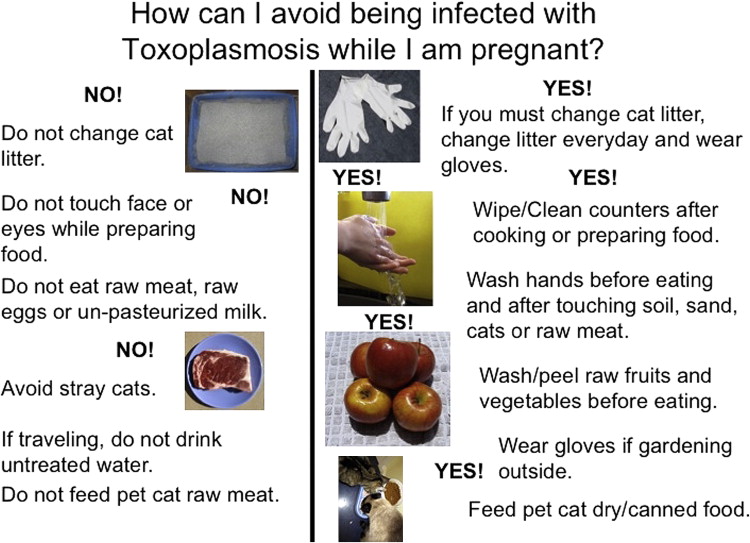Toxoplasmosis is a parasitic infection caused by Toxoplasma gondii, a protozoan capable of infecting most warm-blooded animals, including humans. Although infections are frequently asymptomatic in healthy individuals, toxoplasmosis poses significant health threats to pregnant women and immunocompromised patients. Preventive measures play a pivotal role in limiting transmission and safeguarding public health, particularly in high-risk groups.

Understanding Transmission to Inform Prevention
T. gondii is primarily transmitted through ingestion or contact with infectious oocysts, tissue cysts, or tachyzoites. Prevention begins with understanding these pathways.
Food Safety Measures to Prevent Toxoplasmosis
Foodborne transmission accounts for a significant proportion of infections. Preventing exposure through dietary habits is essential.
Cook Meat Thoroughly
- Ensure meat reaches an internal temperature of at least 67°C (153°F).
- Avoid rare or medium-rare lamb, pork, or venison.
- Use a food thermometer for accurate results.
Freeze Meat Properly
- Freezing at -12°C (10°F) for 2–3 days effectively kills most tissue cysts.
- Industrial freezing is more effective than domestic freezing.
Wash Produce Thoroughly
- Rinse fruits and vegetables under running water.
- Scrub firm produce with a brush to remove soil particles.
- Peel skin when possible.
Avoid Cross-Contamination
- Use separate cutting boards for meat and vegetables.
- Wash utensils, hands, and surfaces after handling raw meat.
- Store raw meat away from other food items in the refrigerator.
Avoid Unpasteurized Dairy Products
- Consume only pasteurized milk and cheese to reduce exposure risk.
Hygiene and Environmental Practices
Environmental exposure to oocysts via contaminated soil, water, or cat feces requires disciplined hygiene practices.
Safe Gardening Habits
- Wear gloves while gardening or handling soil.
- Wash hands and fingernails thoroughly after outdoor activities.
- Avoid consuming raw vegetables grown in untreated soil.
Water Safety
- Avoid untreated water from streams, lakes, or private wells.
- Boil or filter water in regions without regulated water systems.
Pet Care Guidelines for Cat Owners
Cats, as definitive hosts, shed infectious oocysts in their feces. Responsible pet ownership minimizes transmission risk.
Litter Box Management
- Change litter daily to prevent sporulation of oocysts.
- Designate a non-pregnant family member to clean the litter box.
- Wear disposable gloves and wash hands thoroughly afterward.
- Clean the box with boiling water weekly.
Cat Diet and Lifestyle
- Feed cats commercial food or thoroughly cooked meat.
- Do not allow cats to hunt rodents or birds.
- Keep cats indoors to avoid infection from wild prey.
Toxoplasmosis Prevention in Pregnancy
Pregnant women must take additional precautions due to the risk of congenital toxoplasmosis, which can cause miscarriage, stillbirth, or lifelong disabilities in the infant.
Prenatal Screening and Monitoring
- In countries with routine screening, pregnant women should undergo early testing for T. gondii antibodies.
- Seronegative women should receive counseling on prevention strategies.
Avoid High-Risk Foods
- Eliminate raw or undercooked meat, unwashed produce, and unpasteurized dairy from the diet.
Minimize Cat Exposure
- Do not adopt new cats during pregnancy.
- Avoid cleaning the litter box if possible; if not, follow all safety guidelines.
Regular Medical Follow-Up
- In case of suspected infection, early diagnosis and treatment can significantly reduce fetal transmission and severity.
Occupational and Situational Precautions
Certain individuals face higher risks due to their profession or lifestyle. Targeted prevention strategies are essential.
Veterinary and Animal Shelter Workers
- Wear gloves when handling stray or sick animals.
- Sanitize equipment and surfaces after each use.
Slaughterhouse and Butchery Workers
- Use protective clothing and gloves when handling raw meat.
- Undergo periodic health screening in high-incidence areas.
Immunocompromised Patients
- Avoid contact with cat litter and raw meat entirely.
- Consult healthcare providers for tailored preventive regimens.
Preventing Toxoplasmosis in Organ and Blood Donation
Although rare, toxoplasmosis can be transmitted through infected organ transplants or transfusions.
- Donor screening protocols should include testing for T. gondii in endemic regions.
- Recipients, especially those who are immunosuppressed, should receive prophylactic treatment where applicable.
Global Public Health Recommendations
To reduce the burden of toxoplasmosis, health authorities recommend integrated community-wide measures:
- Educate populations on food safety and hygiene.
- Promote responsible pet ownership.
- Implement national screening programs in high-risk regions.
- Monitor seroprevalence trends to inform policies and resource allocation.
Summary of Key Prevention Strategies
| Risk Factor | Prevention Method |
|---|---|
| Undercooked Meat | Cook thoroughly, freeze prior to cooking |
| Cat Feces | Clean litter daily, use gloves, wash hands |
| Soil Contact | Wear gloves while gardening, wash produce |
| Unpasteurized Products | Consume only pasteurized dairy |
| Water Contamination | Drink only treated or boiled water |
| Pregnancy | Avoid high-risk food, screen early, avoid new cats |
| Immunocompromised Status | Avoid exposure entirely, seek medical advice |
Toxoplasmosis prevention hinges on practical, everyday strategies rooted in awareness, hygiene, and behavioral adjustments. While the parasite poses minimal threat to the general population, its impact on pregnant women and immunocompromised individuals can be severe. Through proper food handling, pet care, and targeted health interventions, we can significantly reduce exposure to Toxoplasma gondii and minimize the global burden of this parasitic infection.
Frequently Asked Questions
Can toxoplasmosis be prevented entirely?
While complete prevention is challenging, consistent hygiene, food safety, and pet care practices can significantly reduce risk.
Should pregnant women avoid cats?
Not necessarily. Pregnant women can safely live with cats by avoiding litter box duties and maintaining hygiene.
How can you tell if meat is safe from toxoplasmosis?
Ensure it reaches a safe internal temperature (≥67°C/153°F). Freezing before cooking adds additional safety.
Can toxoplasmosis spread through kissing or casual contact?
No. It is not transmitted through saliva, touch, or respiratory droplets.
Is there a vaccine for toxoplasmosis?
Currently, there is no approved vaccine for humans. Research continues, especially for veterinary applications.

